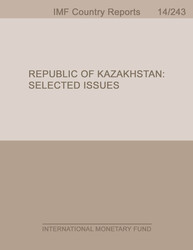
Republic of Kazakhstan: Selected Issues
Inclusive growth is not only important for social cohesion in Kazakhstan but also for macroeconomic stability.
READ MORE...
Volume/Issue:
Volume 2014
Issue 243
Publication date: August 2014
ISBN: 9781484355671
$18.00
Add to Cart by clicking price of the language and format you'd like to purchase
Available Languages and Formats
| English | ||||
| Russian |
Prices in red indicate formats that are not yet available but are forthcoming.
Topics covered in this book
This title contains information about the following subjects.
Click on a subject if you would like to see other titles with the same subjects.
Exports and Imports , Inflation , Labor , Money and Monetary Policy , ISCR , CR , currency depreciation shock , trade balance model , GDP deflator , exchange rate coefficient , upper bound , current account balance , model specification , Trade balance , Dollarization , Inflation , Employment , Global , Central Asia and the Caucasus , Middle East , East Asia , Asia and Pacific
Also of interest
Summary
This Selected Issues paper analyzes whether Kazakhstan has made progress in achieving a more equal income distribution, lower poverty, and a higher level of employment. Given the overarching structural challenges for Kazakhstan, the authorities are stepping up efforts to implement various measures. In order to bolster youth employment and address labor market challenges, the authorities have been revamping a college internship program and a job placement program, which will help to make educated youth competitive in the labor market and to reduce labor market mismatches. The results suggest that Kazakhstan’s economic growth has been broadly inclusive; however, there is room for further improvement. Both income inequality and unemployment in Kazakhstan compare favorably to peers. Fiscal policy could be a useful tool to help reduce income inequality. Better targeting of transfers reduces their fiscal cost and tax levels required to finance them, thus achieving distributional objectives in a more efficient manner. An ambitious structural reform agenda is paramount to Kazakhstan becoming a dynamic emerging market economy and ensuring sustainable and inclusive growth.
Copyright © 2010 - 2026
Powered by:
AIDC



